It was 1442 years ago that Prophet Muhammad (PBUH) and the early Muslims migrated from Makkah to Madinah, which marked the first year of the Hijrah calendar.
The term “Hijrah” has important subtle meanings associated with it other than physical movement from one place to another. In addition to its physical sense, it also means to abandon something and neglect it.
This meaning finds support in some Prophetic traditions such as the one narrated by Abdullah Ibn Umar in which the Prophet (PBUH) said, “The muhajir (emigrant) is the one who abandons what Allah has forbidden” (Bukhari and Muslim).
The idea of a metaphorical Hijrah has numerous references to the life of the Prophet (PBUH). Just as the Prophet’s Hijrah to Medina was a transitional line between two states, a state of weakness to a state of security, the Hijrah of the soul is likewise a transitional line between the human weaknesses for sin to a position of security from sin, a state of disobedience to one of obedience.
The Prophet’s departure from Mecca was a flight from the polytheists and from a hostile unbelieving environment, with the aim of finding security in another secure place and forming a new community based on piety.
In a similar vein, a person undertaking a moral Hijrah migrates from everything God has forbidden without falling prey to his earthly desires. It is a flight for the sake of moral refuge from all forms of evils and corruption.
It is a spiritual leave-taking from oppression to justice; from cruelty, harshness, and pitilessness to mercy, compassion and grace; from intolerance to forbearance; from indulgence to moderation; from miserliness to generosity and munificence; from malignity to benevolence; from selfishness to charity and altruism; from hard-heartedness to sympathy; from hostility to goodwill and friendliness; from conflict and strife to peace and amity; from ignorance to knowledge; from pride to humility; from sins to repentance; and from defiance and resistance to God’s commands to complete submission to Him. It is most of all a return to man’s natural disposition of good.
Like the Prophet’s journey from Mecca to Medina, the flight to moral excellence and obedience is not without difficulties. Man’s existence on earth is not a promenade through life. His path is fraught with hurdles and fears, but with being mindful of Allah and following the guidance of our beloved Prophet (PBUH), it makes the journey in life light and easier.
Sometimes the journey often means forsaking what one desires for what Allah desires. Because man has been ordered to strive for the life prescribed by the Almighty Allah, he cannot succumb to harsh conditions or to his weakness and desires.
He must rely on Allah and cannot blame circumstances that are forced upon him or the temptations he meets along his way, taking in mind that Allah intends us ease and not to place a burden upon us.
He also cannot give in or rely solely on Allah to live the virtuous and pious life required of him. He has to exert effort to attain the glory of Allah’s pleasure. On returning from a battle, the Prophet (PBUH) once said, “We have returned from the lesser jihad to the greater jihad.” This tradition clearly demonstrates man’s part in struggling against his own weakness and inclination for wrongdoing.
The secret nature of the Prophet’s Hijrah and the precautions he took all demonstrate his human insecurities. He ordered Ali to sleep in his bed in his place, chose an unconventional route to Medina, took measures to wipe out their footsteps, and sheltered with his companion Abu Bakr in a cave to hide from the pursuing enemy.
All of this reveals his reliance on Allah but at the same time, his employment of every human endeavour to achieve his goal. In a similar fashion, we are instructed to employ every measure possible to achieve our goal. i.e. obedience to Allah and the attainment of His pleasure both of which will ultimately secure for us Allah’s promise of an eternal life in paradise in the hereafter. This promise alone is a motivating force to do better, to shun disobedience and to strive for Allah’s pleasure.
(Culled from Dar Al-Ifta Al-Missriyyah)

 Join Daily Trust WhatsApp Community For Quick Access To News and Happenings Around You.
Join Daily Trust WhatsApp Community For Quick Access To News and Happenings Around You.

